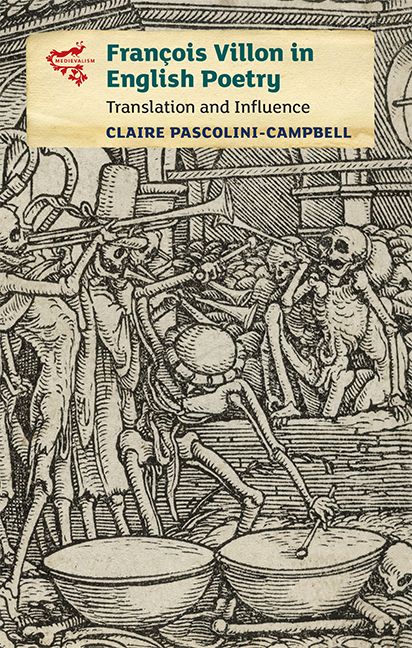Book contents
- Frontmatter
- Contents
- A Note on the Poets and the Poems
- Acknowledgements
- Introduction
- 1 Then and Now: The Legend of Villon in the Middle Ages and in Modernity
- 2 Villon and Swinburne: Finding and Singing Villon
- 3 Villon and Rossetti: Poetics of Strangeness
- 4 Villon and Pound: Modernity and the ‘Mediaeval Dream’
- 5 Villon and Bunting: Prison-Writing and Parody
- 6 Villon and Lowell: Imitation and the Visible Translator
- Conclusion
- Appendices
- Bibliography
- Index
- Medievalism
5 - Villon and Bunting: Prison-Writing and Parody
Published online by Cambridge University Press: 09 October 2019
- Frontmatter
- Contents
- A Note on the Poets and the Poems
- Acknowledgements
- Introduction
- 1 Then and Now: The Legend of Villon in the Middle Ages and in Modernity
- 2 Villon and Swinburne: Finding and Singing Villon
- 3 Villon and Rossetti: Poetics of Strangeness
- 4 Villon and Pound: Modernity and the ‘Mediaeval Dream’
- 5 Villon and Bunting: Prison-Writing and Parody
- 6 Villon and Lowell: Imitation and the Visible Translator
- Conclusion
- Appendices
- Bibliography
- Index
- Medievalism
Summary
BASIL BUNTING (b.1900–d. 1985) discovered the works of Villon when he was a young man living in Paris, and the medieval French poet was to have a profound influence on his early poetry. Like Swinburne and Pound, he identified with the persona of the literary outcast or the Bohemian poète maudit in his work, taking this identification further by likening his experience of incarceration to that of Villon. Less preoccupied with his ‘medievalness’ than his poetic predecessors, Bunting focuses on Villon as a poet from whom to learn how to write poetry, using his verse both to shape and inform his early work and as an Urtext from which to deviate. That Villon was perceived primarily as a mentor or a guide is suggested by the fact that his presence dissipates over the course of Bunting's poetic career, as he becomes more confident in his own poetic identity and voice. None the less, while Bunting's acquaintance with the medieval French poet was short lived, and partially determined by the external circumstances of his carceral experiences and friendship with Ezra Pound, his two poems adapted from Villon are notable for their experimental approach to translation and for the manner in which they helped him to develop his own poetic voice.
‘Villon’ and ‘The Well of Lycopolis’ were composed during the inter-war period, in 1925 and 1935 respectively, and some commentators have read them as being as much influenced by twentieth-century Modernist poets as by their fifteenth-century sources. For instance, the legacy of Bunting's apprenticeship at the hands of Pound and T.S. Eliot has been felt throughout his poetic corpus, and in ‘An English Objectivist? Basil Bunting's Other England’ John Seed explains that:
Though he had developed some of the key elements of his own poetics independently, Bunting remained in many ways a man of the literary generation of the 1920s, a proponent of the kind of poetry represented by Eliot's ‘The Waste Land’ and Pound's early Cantos or ‘Homage to Sextus Propertius’.
However, his greatest allegiance throughout ‘Villon’ and ‘The Well of Lycopolis’ is to his medieval French source as, despite incorporating themes developed by the work of Pound and Eliot, the texts approach translation in their reliance on and fidelity to an identified ST.
- Type
- Chapter
- Information
- François Villon in English PoetryTranslation and Influence, pp. 114 - 140Publisher: Boydell & BrewerPrint publication year: 2018

